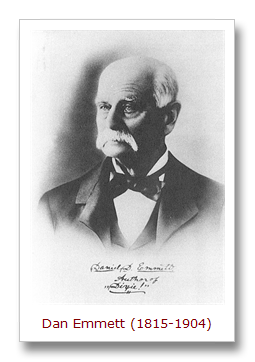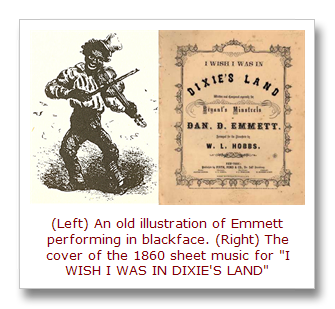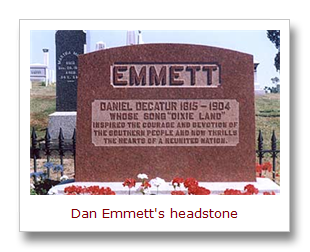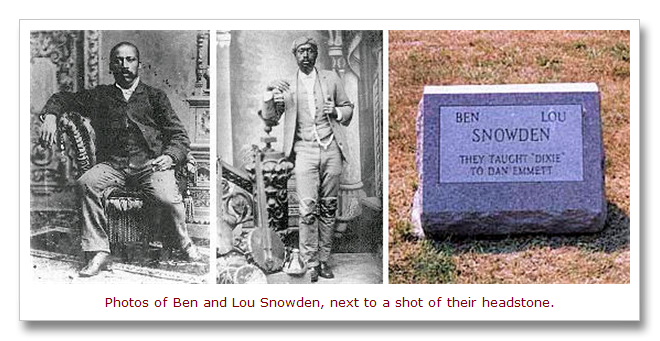The American Civil War is bracketed by two songs with lyrics that are familiar to most people.
The metaphorical end of that war has become associated with The Band’s 1969 song, “The Night They Drove Old Dixie Down.”
The song that became the Confederate states’ anthem at the beginning of the Civil War is popularly known as “Dixie.”
There are a number of ironies about this famous “Southern” song. One is that it was written by a Northerner — Ohio-born minstrel musician Daniel Decatur Emmett.
In the late 1850s, Emmett was a musician and songwriter for Bryant’s Minstrels, a popular blackface minstrel troupe in New York City.
Emmett had a knack for writing catchy songs, such as “Polly Wolly Doodle” and “Old Dan Tucker.”
Dan Bryant, leader of Bryant’s Minstrels, asked Emmett to write a new “walkaround song,” a lively song that could be used to close shows and be performed on the street to attract customers to the theater where the group played, Mechanics’ Hall on Broadway.
Emmett rose to the occasion by writing a song that used and helped popularize a nickname for America’s Southern states, “Dixie Land,” sometimes given as “Dixie’s Land” or just “Dixie” for short.
On April 4, 1859, Bryant’s Minstrels premiered the song in a show at Mechanics’ Hall. The printed playbill called it “Dixie’s Land.” The sheet music published in 1860 used the title “I Wish I Was in Dixie’s Land.”
Like other blackface minstrel songs, the original words were written with grammar and phonetic spellings designed to sound like an uneducated Southern slave might talk:
“I wish I was in de land ob cotton,
Old times dar am not forgotten;
Look away! Look away! Look away! Dixie Land!
In Dixie Land whar I was born in,
Early on one frosty mornin’,
Look away! Look away! Look away! Dixie Land!
Den I wish I was in Dixie! Hooray! Hooray!
In Dixie Land I’ll take my stand.
To lib an’ die in Dixie.
Away, Away, Away down South in Dixie.
Away, Away, Away down South in Dixie.”
The song became highly popular in both northern and southern states during the next two years.
In the South, the lyrics were altered to take on an even more militaristic tone and adopted as a Confederate anthem.
On February 18, 1861, not long before the first shots of the Civil War were fired at Fort Sumter, “Dixie” was played at the inauguration of Confederate President Jefferson Davis. Throughout the Civil War, it was sung with patriotic fervor by Southern troops and civilians.
Dan Emmett, a loyal Union man, was dismayed by the Confederacy’s use of his song. He reportedly told a fellow musician “If I had known to what use they were going to put my song, I will be damned if I’d have written it.”
In the decades after the Civil War, “Dixie” regained some of it’s former nationwide popularity — at least among white Americans.
But to many African Americans, the song’s image of happy “darkies” who love their lot as slaves on a Southern plantation seemed (and still seems) absurd and offensive.
In an NPR story about the song, University of Mississippi historian Charles Reagan Wilson noted that during civil rights demonstrations in the 1960s: “[Blacks] would sing a song like ‘We Shall Overcome’ or ‘The Battle Hymn of the Republic’…But then opponents of integration and black rights would sing ‘Dixie’ as a kind of counter-song asserting white privilege and white supremacy.”
The historic uses of the song make the epitaph on Emmett’s headstone in his hometown of Mount Vernon, Ohio, ironic in itself. It reads:
DANIEL DECATUR 1815–1904
WHOSE SONG “DIXIE LAND”
INSPIRED THE COURAGE AND DEVOTION OF
THE SOUTHERN PEOPLE AND NOW THRILLS
THE HEARTS OF A REUNITED NATION.
Perhaps even more ironic is the possibility that Emmett learned “Dixie” from members of the Snowden family, a family of free blacks who lived near the Emmett family’s farm in Ohio.
The Snowdens had their own musical group, the Snowden Family Band, who performed for black and white audiences from the mid- to late-1800s. Dan Emmett knew the Snowdens and is said to have played music with them.
According to Snowden family tradition, Emmett learned “Dixie” from Ben and Lou Snowden.
This claim is viewed skeptically by some scholars. But it is given credence by others, most notably Howard Sacks, Chair of the Department of Sociology/Anthropology at Kenyon College, who co-authored a book about the Snowdens titled Way up North in Dixie: A Black Family’s Claim to the Confederate Anthem.
Long before that book was published in 2003, some local Ohioans were already convinced.
In 1976, the African American members of a local American Legion Post paid to have a new headstone placed on the joint gravesite of Ben and Lou Snowden in Clinton, Ohio. It says simply: “THEY TAUGHT ‘DIXIE’ TO DAN EMMETT.”
* * * * * * * * * *
Comments? Corrections? Post them on the Famous Quotations Facebook page.
Related reading and listening about blackface minstrels…












